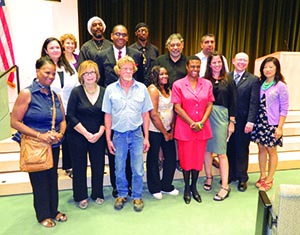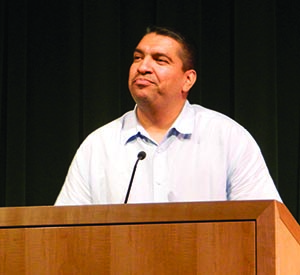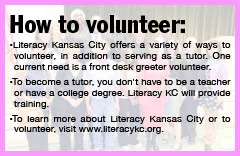
By LESLIE COLLINS Northeast News October 2, 2013 “I’m the kind of guy I don’t like to cry and I try really hard, but sometimes it’s difficult because the stories you hear are so powerful,” said Jose Faus, Kansas City artist and president of The Writers Place Board of Directors.
The night of Sept. 19, both professional writers and current and former students of Literacy Kansas City shared the impact of reading in their lives during The Power of Reading event at the Kansas City Plaza Library. For some, learning how to finally read meant passing a driver’s license test or becoming closer to earning a GED.
The ability to read is something so many take for granted, but in the Kansas City metro, about 225,000 adults are considered functionally illiterate, meaning they can’t read above a fifth grade level, if that.
“People who can’t read and people who can’t write is a real problem in Kansas City and our nation,” Carrie Coogan, executive director and chief executive officer of Literacy Kansas City, told Northeast News. “This is something we should all care about, not just the school districts, not just the community leaders, not just Literacy Kansas City; our entire community should care that there’s people who are out there and struggling and too afraid to admit it.”
For Kansas City Police Department Officer Chato Villalobos, who formerly served in the East Patrol Division and currently serves at the Westside Community Action Network (CAN) Center, literacy is “dear to my heart.”
“I dreaded school because during kindergarten and first grade, I really struggled with mastering language and reading,” Villalobos said.
Villalobos’ parents were undocumented immigrants whose first language was Spanish. Even in high school Villalobos still dreaded school. His sophomore year, he and his best friend were walking home from baseball practice when gang members drove by and shot at both of them. His best friend died from his wounds. For a week, Villalobos stayed home from school. Then his English teacher knocked on his front door. Villalobos was shocked his white English teacher had driven to Kansas City’s westside, a Latino neighborhood known for gang activity.
“My first reaction was, ‘What are you doing here? It’s not safe.'” Villalobos said.
But, his English teacher didn’t care and told Villalobos, ‘You’ve got to get back in school. You’re a talented writer and a very good student.’ He convinced me. He said, ‘Your mother doesn’t have papers, she has no social security card, she doesn’t know the language. What’s your excuse? You were born in the United States and speak two languages.’ I returned to school and he convinced me to start reading culturally relevant books, like ‘Of Mice and Men’ by John Steinbeck.”
Villalobos graduated from college, and through Westside CAN, he assists with poetry clubs in local schools.
“The power of reading has really transformed my life,” said Tammy Burrage, who’s been a student in the Literacy Kansas City program for two-and-a-half years. “Learning to read has changed my life in many positive ways.
“When I started working with my tutor, I had a second grade reading level. Now, I am at a fourth grade reading level and continue to improve every week. I can read a book to my grandson. I can read the Bible with my daughter. I know how to look up words in the dictionary and sound out words. I can read a bus schedule to help me get around town. After studying hard and taking a test, I recently got my driver’s license.”
Burrage said one of her personal goals is to graduate from college and become a counselor for abused women and children.
Growing up, reading was a painful struggle for Cedric Hurtt. To avoid being called on to read, he’d raise his hand to go to the bathroom or find other ways to hide his illiteracy.
During college, his sister Chandra would read his class assigned books aloud to him.
“Without that, I couldn’t have made it as far as I did in college. I probably would have dropped out and said, ‘I’m done,'” Hurtt said.
Hurtt had tried other reading programs, but it wasn’t until he began attending Literacy Kansas City in 1988 at the age of 28 that things finally clicked. What set this program apart, he said, was the one-on-one tutoring he received.
“Literacy Kansas City is very important to me because before I met them I felt like a half person,” he said. “It (program) made me the person I am today. It helped me build my business, it helped me write and illustrate three different books…
“It’s tough raising children and you don’t know how to read; that’s not easy. Thank goodness for Literacy Kansas City because I got to the point where I could help them with their homework. Without this, I don’t know where my boys would be.”
Both of his sons are now attending college, one at the University of Missouri-Kansas City and the other at the University of Kansas.
“People ask why I left television and radio to come work in a nonprofit,” Coogan said. “You got a small taste of why tonight. When you see students come into our building every single day and admit they can’t read and commit their time to learning to read, there’s nothing more inspiring to me.”
Currently, 400 students are enrolled in the program, which provides one-on-one tutoring sessions to each student twice a week for 90 minutes. A number of potential students are on a waiting list and Literacy Kansas is always looking for additional tutors, Coogan said.
In addition to its general literacy program, Literacy Kansas City also offers programs geared toward those attending college, those on probation and parole and youth who are homeless.
“What’s so great about it (Literacy Kansas City) is even one person can truly make a difference in somebody’s life, especially if it’s a young person,” she said. “For the rest of their life, you’re making a difference for them.”


















